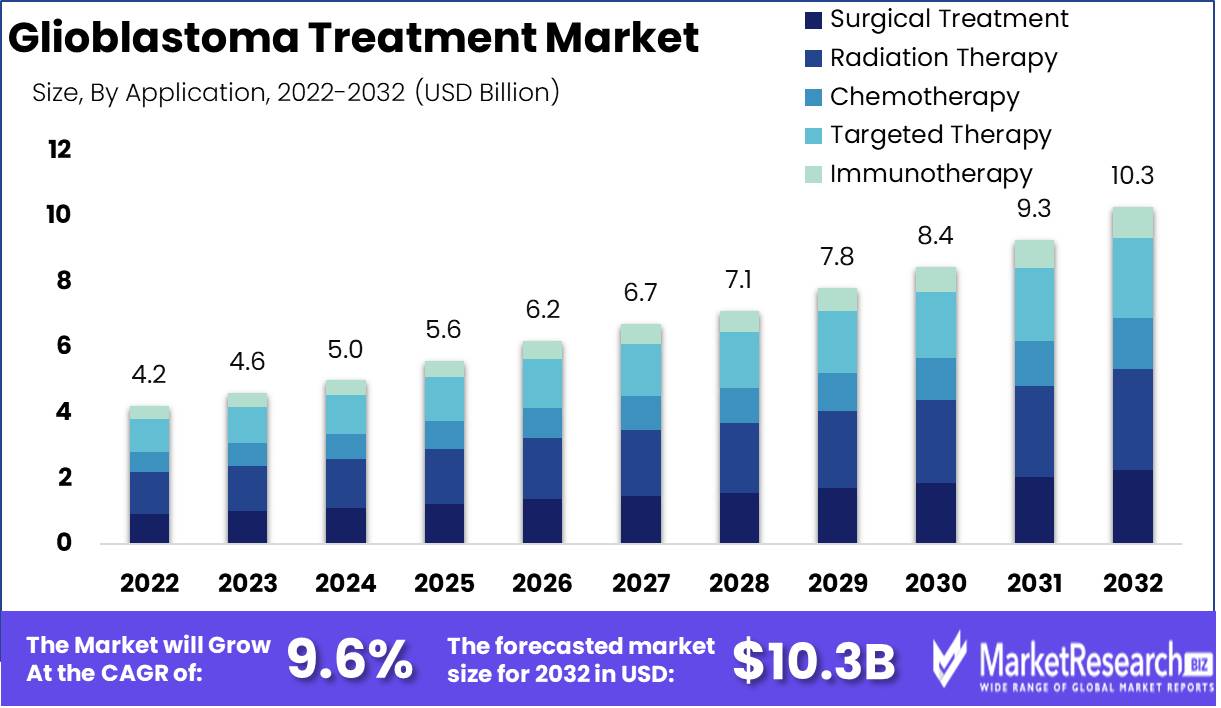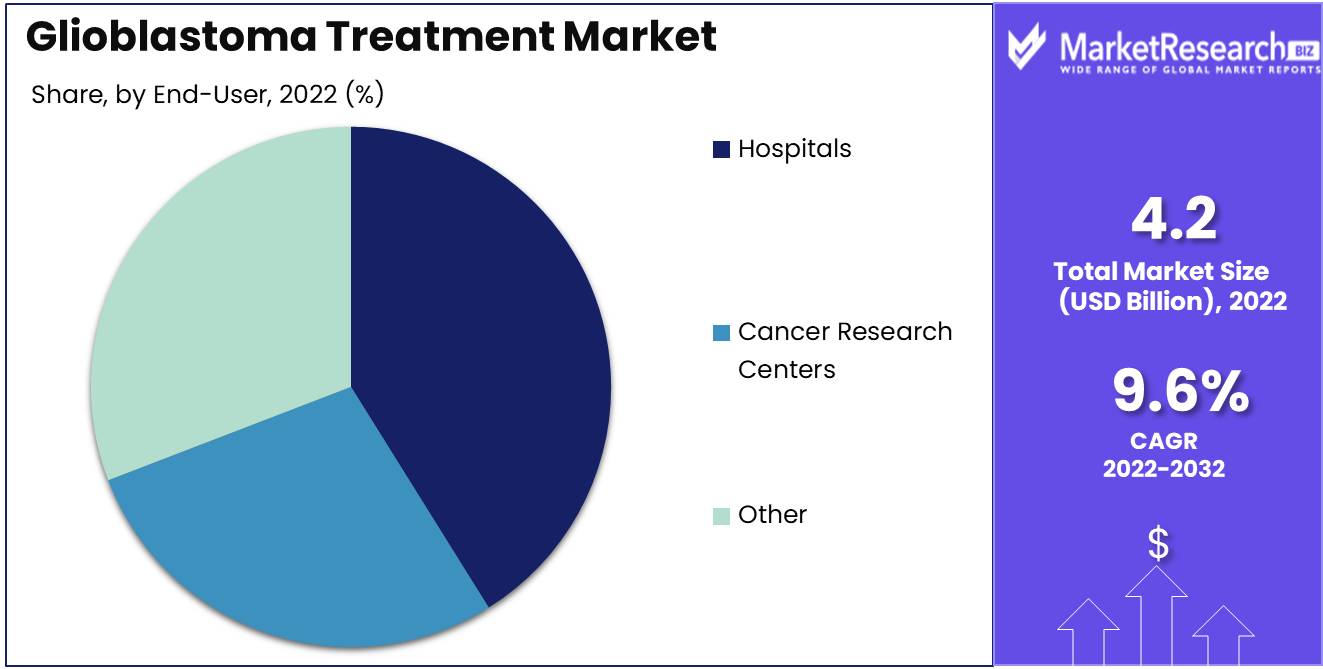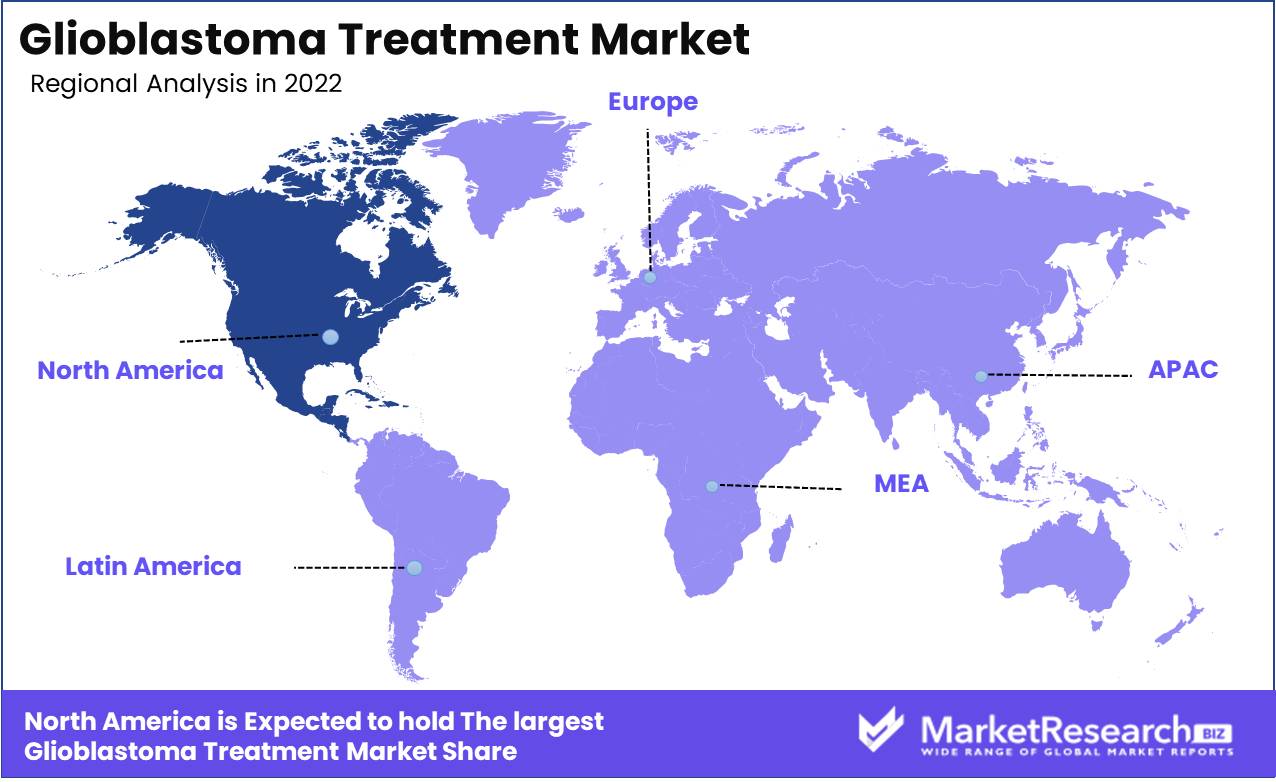
Glioblastoma Treatment Market By Treatment Type (Surgical Treatment, Radiation Therapy, Chemotherapy, Targeted Therapy), By End-User (Hospitals, Cancer Research Centers, Others), By Region And Companies - Industry Segment Outlook, Market Assessment, Competition Scenario, Trends, And Forecast 2023-2032
-
37533
-
June 2023
-
137
-
-
This report was compiled by Correspondence Linkedin | Detailed Market research Methodology Our methodology involves a mix of primary research, including interviews with leading mental health experts, and secondary research from reputable medical journals and databases. View Detailed Methodology Page
-
Report Overview
Glioblastoma Treatment Market size is expected to be worth around USD 10.3 Bn by 2032 from USD 4.2 Bn in 2022, growing at a CAGR of 9.6% during the forecast period from 2023 to 2032.
The global Glioblastoma Treatment Market is an exciting and rapidly expanding arena that incorporates the complex diagnosis and treatment of glioblastoma, a particularly aggressive and difficult-to-manage form of brain cancer. This industry is projected to experience remarkable growth over the next ten years, propelled by notable advancements in medical technology, heightened awareness of the disease, and the expansion of a patient support system. The multifarious nature of glioblastoma necessitates a multidisciplinary approach to treatment, and the overarching objective of the global glioblastoma treatment market is to confront this complex challenge head-on.

The glioblastoma market is resolutely committed to the development of innovative therapies for glioblastoma patients, with the ultimate objectives of providing viable treatment options, enhancing symptomatic relief, and possibly increasing survival rates. The primary objective of this dynamic market is the development and commercialization of innovative therapeutic solutions that can empower patients to combat this pernicious disease.
Glioblastoma, which is characterized by its unremitting aggression and resistance to conventional treatment modalities, is a pressing public health concern. As a beacon of hope, the pervasive global glioblastoma treatment market strives to combat this formidable challenge by developing innovative treatments and therapies. The introduction of novel interventions has the potential to significantly improve prognosis, enhance quality of life, and ultimately extend survival rates for afflicted patients.
The relentless pursuance of novel remedies and therapies is a central focus of the glioblastoma market, as evidenced by the recent emergence of a number of noteworthy innovations. Immunotherapies that utilize the intricate workings of the immune system to wage a ferocious assault on malignant cells are of the utmost importance. Simultaneously, the use of gene therapy to specifically target and eliminate malignant cells has demonstrated immense promise as an innovative method.
As the development of novel treatments and therapies for glioblastoma progresses, a number of ethical concerns inevitably arise and require careful consideration. Relevant issues include patient consent, the protection of sensitive data privacy, and equitable access to limited resources. Industry stakeholders and key actors in this dynamic market are increasingly emphasizing the importance of transparency, explainability, and accountability in fostering responsible growth in the glioblastoma treatment domain.
Driving factors
A High Rate of Glioblastoma
The high incidence of glioblastoma is anticipated to drive the growth of the global glioblastoma treatment market in coming years. This type of cancer is one of the most aggressive and challenging to treat, placing a substantial burden on healthcare information systems around the globe. However, market.us's report identifies several positive developments that could aid in the fight against this disease.
Advancements in Treatment Techniques
For instance, advances in neurosurgical techniques have made it simpler for physicians to remove tumors with minimal collateral damage. Radiation therapy and chemotherapy have also demonstrated promising results in shrinking tumors or halting their growth. In addition, the increasing emphasis on targeted therapies, which seek to attack cancer cells rather than benign cells, is a game-changer in the treatment of glioblastoma.
Unveiling the Glioblastoma Mysteries
In addition, research advancements in glioblastoma biology have resulted in a better understanding of the disease and its mechanisms, yielding valuable insights into possible new therapeutics. All of these factors, coupled with the rising awareness of glioblastoma, are anticipated to propel the growth of the global glioblastoma treatment market to a significant degree.
Telemedicine and Generic Medicines
As potential market disruptors, generic pharmaceuticals that offer affordable alternatives to existing treatments could pose a threat. The advent of telemedicine and remote consulting services may also have an effect on the competitive landscape by facilitating patients' access to healthcare professionals. In the Glioblastoma Treatment Market, addressing Acute Agitation and Aggression Treatment during therapy is crucial for improving patient comfort and compliance.
New Possibilities
Emerging trends or variations in consumer behavior could have an effect on the market. A greater emphasis on holistic and alternative therapies, for instance, could present new opportunities for market participants to offer complementary treatments. Overall, the global glioblastoma treatment market is anticipated to experience robust development in the coming years, driven by a combination of technological advancements, the introduction of novel therapies, and an increased awareness of the disease.
Restraining Factors
Glioblastoma's Complexity and Aggressiveness
Glioblastoma is an extremely rare, notably aggressive, and notoriously difficult to treat form of brain cancer. This paragraph discusses the challenges presented by the complexity and aggressiveness of glioblastoma. This includes the tumor's rapid growth, its infiltrative nature, and its diverse composition.
Limited Effectiveness of Existing Therapies
The effectiveness of the current standard treatment for glioblastoma is limited. This paragraph emphasizes the low success rate of combination therapies involving radiation and chemotherapy, as well as the variable efficacy of innovative therapies such as targeted therapy and immunotherapy. In addition, this paragraph highlights the moderate success rate of radiation and chemotherapy in combination therapy.
Difficulties in Drug Administration to the Brain
Due to the complex morphology of the brain, it may be challenging to deliver medications directly to the location of the glioblastoma tumor. This paragraph discusses the selective access provided by the blood-brain barrier (BBB) and the need for effective drug delivery systems capable of penetrating the BBB while limiting neurotoxicity to healthy brain tissue. These mechanisms need to be created.
Negative Effects of Treatments
The adverse effects caused by glioblastoma treatments can differ in severity from mild to severe. This paragraph discusses the risks associated with surgery, the short- and long-term side effects of radiation therapy, and the typical adverse effects of chemotherapy.
Treatment Type Analysis
Radiation therapy segment dominates the glioblastoma treatment market. Because it reduces tumor development and improves patient outcomes. Radiation therapy is a key treatment for glioblastoma. Radiation therapy is an effective treatment for glioblastoma and improves survival, according to recent studies. To provide proper treatment and care, hospitals and healthcare facilities must increase their radiation therapy sections. Radiation therapy is becoming more popular in the glioblastoma treatment market. Radiation treatment is known for precisely targeting cancer cells while sparing healthy cells. In addition, advanced radiation therapy procedures including intensity-modulated radiation therapy (IMRT) and stereotactic radiosurgery (SRS) have boosted patient trust in the treatment. Radiation therapy's use for glioblastoma treatment is expected to rise in the coming years as patients and consumers become more aware of its benefits.
Radiation therapy is expected to grow fastest in the glioblastoma treatment market. Due to the rise of glioblastoma and the need for better treatments. Proton treatment and carbon-ion therapy will boost the segment's growth. Cutting-edge technology improve treatment accuracy and decrease side effects.
End-User Analysis
Hospitals segment dominate the global glioblastoma treatment market. Patients with glioblastoma prefer hospitals since they have several treatment choices and healthcare personnel. The rise of hospitals and healthcare facilities in emerging nations has also helped the market. These patients have easy access to hospitals and are more likely to seek treatment. Patients and customers are increasingly favoring hospitals in the glioblastoma treatment market. Hospitals have several treatment choices and qualified doctors who can handle difficult conditions. Hospitals' sophisticated medical equipment and facilities have increased patient trust.
Hospitals will expand fastest in the worldwide glioblastoma treatment market. Due to rising glioblastoma rates and desire for better treatments. The industry is likely to increase further as emerging economies add hospitals and healthcare facilities. Hospitals are projected to play a major role in glioblastoma treatment as healthcare infrastructure improves in these nations.

Key Market Segments
By Treatment Type
- Surgical Treatment
- Radiation Therapy
- Chemotherapy
- Targeted Therapy
- Immunotherapy
By End-User
- Hospitals
- Cancer Research Centers
- Other End-Users
Growth Opportunity
A Complicated and Prospective Lan
Glioblastoma, a formidable form of brain cancer that affects millions of people around the globe, has a highly aggressive nature that originates from astrocytes. These cells provide vital support and protection for the brain's nerve cells. Unfortunately, glioblastoma is difficult to treat, with a 15-month average survival rate. Nonetheless, recent technological advancements and the introduction of innovative therapies present the global glioblastoma treatment market with substantial growth opportunities.
Identifying Genetic Variations
Targeted therapy emerges as a promising treatment strategy for glioblastoma. The genetic mutations that fuel the growth and survival of cancer cells provide a unique therapeutic target. Utilizing drugs that inhibit their function, this type of targeted therapy focuses in on particular molecules or pathways involved in these processes. In recent years, there has been a surge in the development of novel treatments that target glioblastoma's unique genetic mutations. Notably, the monoclonal antibody bevacizumab targets vascular endothelial growth factor (VEGF), a key player in cancer cell nourishment via blood vessel development. Bevacizumab's capacity to improve progression-free survival in glioblastoma patients has led to regulatory approvals for the treatment of recurrent glioblastoma.
Disclosing New Horizons
Clinical trials are the foundation for the development of novel therapies, and they play a crucial role in propelling the growth of the global glioblastoma treatment market. These trials facilitate the evaluation of novel treatments' efficacy, safety, and potential adverse effects. In recent years, there has been a remarkable increase in glioblastoma clinical trials involving new drugs, combination therapies, and immunotherapies. This increase in clinical trials results in more effective remedies for glioblastoma, fostering market growth.
The Precision Medicine Movement
Precision medicine, an emerging revolutionary discipline, uses genetic information to customize medical treatments for individual patients. Precision medicine enables the identification of mutations or biomarkers that are unique to each patient's glioblastoma, thereby facilitating personalized treatments that target these abnormalities. This innovative strategy has enormous potential for enhancing patient outcomes and driving growth in the global glioblastoma treatment market. Notably, genetic testing reveals mutations in the IDH1 or IDH2 alleles, which are associated with a better prognosis for glioblastoma. Patients with glioblastoma may soon have access to more effective treatments as a result of ongoing clinical trials examining drugs tailored to these mutations.
Collaboration's Role in Progress
The expansion of the global glioblastoma treatment market is dependent on nurturing collaboration between various stakeholders. Pharmaceutical companies, research institutions, and neuro-oncology experts each contribute distinctive perspectives and expertise to the table. Collaboration expedites treatment development, improves the design of clinical trials, and ensures patient-centered therapeutic approaches. Novocure, a prominent global oncology company, exemplifies this collaboration by partnering with prestigious research institutions to investigate the use of tumor treating fields (TTFs) in the treatment of glioblastoma. TTFs, a noninvasive therapy that uses electric fields to inhibit cancer cell division, have the potential to induce cell death. Through such collaborations, Novocure and research institutions created a new TTF device and obtained regulatory approval for the treatment of glioblastoma.
Creating a Path Forward
The global glioblastoma treatment market is buoyed by innovative treatments targeting genetic mutations, a growing number of clinical trials, the incorporation of precision medicine approaches, and the collaborative efforts of industry stakeholders. These technological and therapeutic advancements offer patients with glioblastoma, a historically incurable disease, hope. As the market continues to expand, it is essential that stakeholders continue to nurture collaboration and investigate novel treatment options, ultimately improving patient outcomes.
Latest Trends
The Importance of Surgery in Glioblastoma Therapy
The primary treatment approach for glioblastoma is surgical intervention, followed by adjuvant radiation and chemotherapy. The objective of surgery is to remove as much of the tumor as possible; however, due to the infiltrative character of glioblastomas, total excision is illusive. Adjuvant radiation and chemotherapy are essential because they specifically target any residual tumor cells that may persist after surgery, thereby enhancing treatment efficacy.
Molecular Profiling and Specific Treatments
Utilizing targeted therapies based on molecular profiling induces a paradigm shift in the treatment of glioblastoma. This cutting-edge technique involves assessing the genetic makeup of a tumor to determine which medications have the highest probability of being effective. Revolutionizing the field of glioblastoma treatment, this individualized approach not only improves patient outcomes but also reduces the risk of adverse side effects.
Immunotherapeutic Progress
Immunotherapeutic approaches to the treatment of glioblastoma are gaining ground. These techniques involve the use of medications that stimulate the immune system to recognize and destroy cancer cells. Checkpoint inhibitors, CAR-T cell therapy, and vaccines targeting specific cancer antigens are promising treatments. Innovative therapies that leverage the immune system's prowess have the potential to improve glioblastoma treatment outcomes.
Cancer-Treating Fields Treatment
Advancements in tumor-treating fields (TTFields) therapy are transforming the glioblastoma treatment landscape. This technique employs electric fields to inhibit cell division in cancer cells, thereby providing a novel noninvasive treatment modality. Despite the fact that the precise mechanism of action has not yet been fully elucidated, studies have demonstrated the efficacy of TTFields therapy, especially when combined with other treatments. Its incorporation into glioblastoma treatment protocols is providing patients with new hope and contributing to positive outcomes.
Ahead of the Curve in Glioblastoma Treatment
As the glioblastoma treatment market continues to evolve, it is clear that novel approaches are necessary to improve patient outcomes. At [Your Company Name], we are committed to providing our clients with the most up-to-date information and insights in this dynamic industry. Our dedication to remaining ahead of the curve ensures that we provide cutting-edge solutions and contribute to the ongoing advancement of glioblastoma treatment.
Regional Analysis
The Glioblastoma Treatment Market is Dominated by North America. North America emerges as a significant and influential participant on the glioblastoma treatment market. With its sophisticated healthcare infrastructure, robust research and development activities, and access to innovative therapies, North America leads the fight against this aggressive brain malignancy. Because of its superior healthcare infrastructure, North America dominates Glioblastoma Treatment Markets. The region's medical institutions are supplied with the most advanced diagnostic and treatment technologies. This facilitates the timely and accurate diagnosis of glioblastoma and the deliverance of comprehensive treatment options, resulting in improved patient outcomes.
Significant contributions to glioblastoma treatment in North America can be attributed to its robust research and development efforts. Respected research institutions, academic institutions, and pharmaceutical companies in the region actively engage in ground-breaking research and clinical trials in an effort to advance knowledge and discover novel therapies. North America is at the vanguard of glioblastoma research due to its unceasing pursuit of scientific advancement, which fosters the development of novel treatment approaches.
The unparalleled availability of innovative therapies in North America bolsters its dominant position in the glioblastoma treatment market. The region is a focal point for clinical trials and the introduction of innovative treatments. North American glioblastoma patients have early access to emerging therapies, such as targeted therapies, immunotherapies, and other novel treatment modalities. This accessibility expands the options available to patients and increases their likelihood of experiencing favorable outcomes.
As Glioblastoma Treatment Markets evolves, North America is poised to maintain its dominance. The commitment of the region to advancing healthcare infrastructure, fostering research and development, and facilitating patient access to innovative therapies will continue to shape the future of glioblastoma treatment. Leadership in North America paves the way for ongoing progress, offering glioblastoma patients hope and spurring advances in the global struggle against this devastating disease.

Key Regions and Countries
North America
- US
- Canada
- Mexico
Western Europe
- Germany
- France
- The UK
- Spain
- Italy
- Portugal
- Ireland
- Austria
- Switzerland
- Benelux
- Nordic
- Rest of Western Europe
Eastern Europe
- Russia
- Poland
- The Czech Republic
- Greece
- Rest of Eastern Europe
APAC
- China
- Japan
- South Korea
- India
- Australia & New Zealand
- Indonesia
- Malaysia
- Philippines
- Singapore
- Thailand
- Vietnam
- Rest of APAC
Latin America
- Brazil
- Colombia
- Chile
- Argentina
- Costa Rica
- Rest of Latin America
Middle East & Africa
- Algeria
- Egypt
- Israel
- Kuwait
- Nigeria
- Saudi Arabia
- South Africa
- Turkey
- United Arab Emirates
- Rest of MEA
Key Players Analysis
Currently, there is a sizable expansion in the Global Glioblastoma Treatment Market. Several key actors are devising innovative treatment methods to combat the disease, contributing to its growth. Several significant corporations such as Merck KGaA, F. Hoffmann-La Roche Ltd, Bristol-Myers Squibb Company, Genentech, Inc., Novartis AG, and AbbVie Inc. dominate the market.
Merck KGaA is one of the primary market players, with a significant presence in numerous global regions. They have devised innovative immunotherapy approaches, such as cancer vaccines and Immuno-Oncology therapies, which concentrate on activating the body's immune system to combat cancer cells.
In contrast, F. Hoffmann-La Roche Ltd. has devised a variety of targeted therapies for the treatment of glioblastoma. Avastin, the primary medication of the company, is one of the most commonly prescribed drugs for glioblastoma. The drug inhibits the development of blood vessels in tumors, thereby preventing their proliferation.
Other market leaders, such as Novartis AG and AbbVie Inc., are also making significant advances. They have made substantial investments in research and development to develop novel treatment techniques and innovative therapies for glioblastoma. Novartis AG has devised a revolutionary immunotherapy treatment known as CAR-T cell therapy, which targets and destroys cancer cells in the body using the patient's immune cells.
Top Key Players in Glioblastoma Treatment Market
- Mylan N.V.
- Elekta
- Merck & Co
- F. Hoffmann-La Roche Ltd.
- Pfizer Inc.
- Teva Pharmaceutical Industries Ltd
- Sun Pharmaceutical Industries Ltd.
- Novartis AG
- Brainlab AG
- Bristol Myers Squibb
- Bayer AG
- AstraZeneca
- Other Key Players
Recent Development
In 2021, The FDA has approved the first home-use rapid gonorrhea test. Everlywell Gonorrhea Test is a self-collected sample test that can be conducted in as little as 15 minutes.
In 2020, Researchers at the University of California, San Francisco have devised a new gonorrhea test that can detect antibiotic-resistant bacteria. The test, known as the PACE assay, is still in its infancy, but it has the potential to revolutionize gonorrhea diagnostics.
In 2019, The World Health Organization (WHO) has issued a warning that gonorrhea is becoming more resistant to antibiotics. The World Health Organization has urged for new research into testing and treatment methods for gonorrhea.
In 2018, According to the CDC, gonorrhea rates in the United States reached an all-time hig. The CDC attributed the increase in gonorrhea rates to the spread of gonorrhea resistant to antibiotics.
Report Scope:
Report Features Description Market Value (2022) USD 4.2 Bn Forecast Revenue (2032) USD 10.3 Bn CAGR (2023-2032) 9.6% Base Year for Estimation 2022 Historic Period 2016-2022 Forecast Period 2023-2032 Report Coverage Revenue Forecast, Market Dynamics, COVID-19 Impact, Competitive Landscape, Recent Developments Segments Covered By Treatment Type (Surgical Treatment, Radiation Therapy, Chemotherapy, Targeted Therapy, Immunotherapy)
By End-User (Hospitals, Cancer Research Centers, Other End-Users)Regional Analysis North America – The US, Canada, & Mexico; Western Europe – Germany, France, The UK, Spain, Italy, Portugal, Ireland, Austria, Switzerland, Benelux, Nordic, & Rest of Western Europe; Eastern Europe – Russia, Poland, The Czech Republic, Greece, & Rest of Eastern Europe; APAC – China, Japan, South Korea, India, Australia & New Zealand, Indonesia, Malaysia, Philippines, Singapore, Thailand, Vietnam, & Rest of APAC; Latin America – Brazil, Colombia, Chile, Argentina, Costa Rica, & Rest of Latin America; Middle East & Africa – Algeria, Egypt, Israel, Kuwait, Nigeria, Saudi Arabia, South Africa, Turkey, United Arab Emirates, & Rest of MEA Competitive Landscape Key Players, Mylan N.V., Elekta, Merck & Co, F. Hoffmann-La Roche Ltd., Pfizer Inc., Teva Pharmaceutical Industries Ltd, Sun Pharmaceutical Industries Ltd., Novartis AG, Brainlab AG, Bristol Myers Squibb, Bayer AG, AstraZeneca, Other Key Players Customization Scope Customization for segments, region/country-level will be provided. Moreover, additional customization can be done based on the requirements. Purchase Options We have three licenses to opt for: Single User License, Multi-User License (Up to 5 Users), Corporate Use License (Unlimited User and Printable PDF) -
-
- Mylan N.V.
- Elekta
- Merck & Co
- F. Hoffmann-La Roche Ltd.
- Pfizer Inc.
- Teva Pharmaceutical Industries Ltd
- Sun Pharmaceutical Industries Ltd.
- Novartis AG
- Brainlab AG
- Bristol Myers Squibb
- Bayer AG
- AstraZeneca
- Other Key Players




